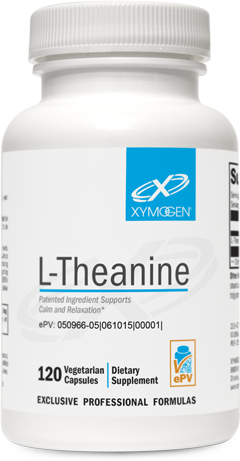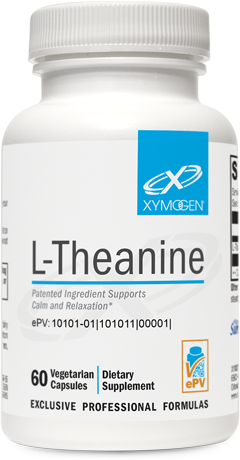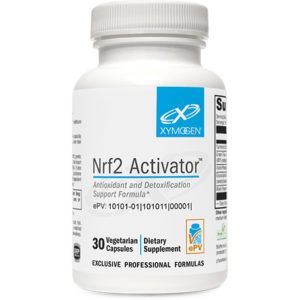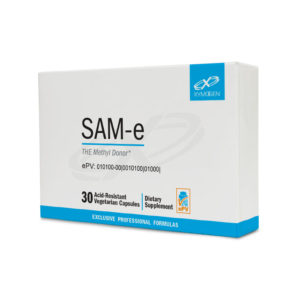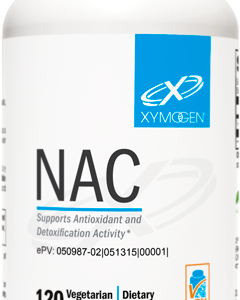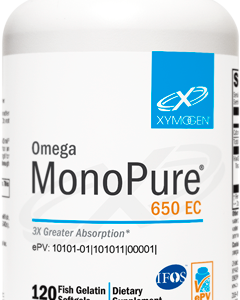Scientific Information/Data
Green tea, prepared from the Camellia sinensis plant, has been consumed since ancient times for its calming influence. Modern research has looked into this “ancient wisdom” and revealed that L-theanine, an amino acid found almost exclusively in green tea, has specific and positive effects on the brain and nervous system, especially the promotion of relaxation without drowsiness.*
Neurological and Brain Support Human studies suggest that within 40 minutes of oral administration, L-theanine positively affected alpha waves in the brain, a phenomenon indicating relaxation.[1] An eight-week, randomized, double-blind, placebo-controlled study, based on the premise that L-theanine “possesses neuroprotective, mood-enhancing, and relaxation properties,”[2] suggested that 400 mg of L-theanine per day was found to be safe and effective. A double-blind counterbalanced study suggested that oral L-theanine positively influenced heart rate and salivary IgA levels, attenuated sympathetic nervous system activation, and positively supported individuals’ normal response to stress. [3] In examining L-theanine’s effect on cognition, a randomized, double-blind, placebo-controlled study of 91 subjects suggested that individuals taking a combination of L-theanine and green tea extract experienced significant increases in theta waves in several areas of the brain, indicative of increased cognitive alertness.*[4]
In cell studies, L-theanine appears to support neuronal health despite the presence of environmental toxins that ordinarily would increase the vulnerability of nigral dopaminergic neurons and negatively affect their function. L-theanine also appears to support neurological health by exerting a positive and significant impact on neurotrophic factors in the brain and assisting cell-signaling activity.*[5]
Research into animal neurochemistry suggests that L-theanine positively supports overall nervous system health and activity due to its positive effects on serotonin, dopamine, and GABA levels, as well as its modulation of excitatory and inhibitory neurotransmission.[6,7] L-theanine crosses the blood-brain barrier intact and may continue to balance neurochemistry by blocking glutamate transport, significantly reducing levels of extracellular glutamate and supporting the release of dopamine and glycine from neurons.*[6,8,9]
Hepatic, Detoxification, and Cardiovascular Support Research studying ethanol metabolism and hepatic toxicity in animals suggests that administration of L-theanine increases liver alcohol dehydrogenase and aldehyde dehydrogenase activity, reducing blood ethanol concentration within one hour compared to controls. It is also suggested that L-theanine’s effect on cytochrome P450 2E1 activity, glutathione recovery, and antioxidant mechanisms supports healthy liver tissue and function.[10-12] L-theanine was observed to significantly inhibit hydrogen peroxide-induced cell death, and it may play an important role in the maintenance of liver health.[13] L-theanine, along with green tea polyphenols, was found to provide antioxidant activity that supports healthy LDL and oxidation levels and may subsequently support cardiovascular health.[14-16] Animal and human studies suggest that L-theanine supports healthy blood pressure in the normal range, in part because it moderates the negative side effects of caffeine.*[1,17,18]
L-theanine and Suntheanine® Although theanine exists in both L- and D- forms, L-theanine is the preferred form due to its greater intestinal absorption and renal retention.[19] An analysis of six commercial products revealed that five of them contained the poorly absorbed D-theanine along with L-theanine. Only Suntheanine, the brand in Xymogen’s L-Theanine, appeared to contain only the preferred L-theanine enantiomer.[20] Suntheanine is protected by several patents that cover applications, such as reducing anxiety and promoting relaxation. The FDA has consequently approved the following structure/function claims regarding L-theanine: it reduces stress, it eases nervousness due to common everyday overwork and fatigue, and it reduces nervous irritability.[18,21] Xymogen’s L-Theanine provides 400 mg of Suntheanine L-theanine per two-capsule dose.*
References
- Juneja LR, Chu D-C, Okubo T, et al. L-theanine – a unique amino acid of green tea and its relaxation effect in humans. Trends Food Sci Technol. 1999;10:199- 204. http://dx.doi.org/10.1016/S0924-2244(99)00044-8.
- Ritsner MS, Miodownik C, Ratner Y, et al. L-theanine relieves positive, activation, and anxiety symptoms in patients with schizophrenia and schizoaffective disorder: an 8-week, randomized, double-blind, placebo-controlled, 2-center study. J Clin Psychiatry. 2011 Jan;72(1):34-42. [PMID: 21208586]
- Kimura K, Ozeki M, Juneja LR, Ohira H. L-Theanine reduces psychological and physiological stress responses. Biol Psychol. 2007 Jan;74(1):39-45. [PMID: 16930802]
- Park SK, Jung IC, Lee WK, et al. A combination of green tea extract and l-theanine improves memory and attention in subjects with mild cognitive impairment: a double-blind placebo-controlled study. J Med Food. 2011 Apr;14(4):334-43. [PMID: 21303262]
- Cho HS, Kim S, Lee SY, et al. Protective effect of the green tea component, L-theanine on environmental toxins-induced neuronal cell death. Neurotoxicology. 2008 Jul;29(4):656-62. [PMID: 18452993]
- Yokogoshi H, Kobayashi M, Mochizuki M, et al. Effect of theanine, r-glutamylethylamide, on brain monoamines and striatal dopamine release in conscious rats. Neurochem Res. 1998 May;23(5):667-73. [PMID: 9566605]
- Nathan PJ, Lu K, Gray M, et al. The neuropharmacology of L-theanine (N-ethyl-L-glutamine): a possible neuroprotective and cognitive enhancing agent. J Herb Pharmacother. 2006;6(2):21-30. Review. [PMID: 17182482]
- Yamada T, Terashima T, Okubo T, et al. Effects of theanine, r-glutamylethylamide, on neurotransmitter release and its relationship with glutamic acid neurotransmission. Nutr Neurosci. 2005 Aug;8(4):219-26. [PMID: 16493792]
- Kakuda T, Hinoi E, Abe A, et al. Theanine, an ingredient of green tea, inhibits [3H]glutamine transport in neurons and astroglia in rat brain. J Neurosci Res. 2008 Jun;86(8):1846-56. [PMID: 18293419]
- Sadzuka Y, Inoue C, Hirooka S, et al. Effects of theanine on alcohol metabolism and hepatic toxicity. Biol Pharm Bull. 2005 Sep;28(9):1702-6. [PMID: 16141543]
- Li G, Ye Y, Kang J, et al. l-Theanine prevents alcoholic liver injury through enhancing the antioxidant capability of hepatocytes. Food Chem Toxicol. 2012 Feb;50(2):363-72. [PMID: 22019691]
- Sugiyama T, Sadzuka Y. Theanine, a specific glutamate derivative in green tea, reduces the adverse reactions of doxorubicin by changing the glutathione level. Cancer Lett. 2004 Aug 30;212(2):177-84. [PMID: 15279898]
- Li G, Kang J, Yao X, et al. The component of green tea, L-theanine protects human hepatic L02 cells from hydrogen peroxide-induced apoptosis. European food research & technology (Internet). 2011;233(3):427-35. http://cat.inist.fr/?aModele=afficheN&cpsidt=24465632. Accessed March 28, 2012.
- Yokozawa T, Dong E. Influence of green tea and its three major components upon low-density lipoprotein oxidation. Exp Toxicol Pathol. 1997 Dec;49(5):329- 35. [PMID: 9455677]
- Dufresne CJ, Farnworth ER. A review of latest research findings on the health promotion properties of tea. J Nutr Biochem. 2001 Jul;12(7):404-421. [PMID: 11448616]
- NutriScience. Suntheanine® (Introduction). http://www.l-theanine.com/intro.htm. Accessed March 29, 2012.
- Rogers PJ, Smith JE, Heatherley SV, et al. Time for tea: mood, blood pressure and cognitive performance effects of caffeine and theanine administered alone and together. Psychopharmacology (Berl). 2008 Jan;195(4):569-77. [PMID: 17891480]
- NutriScience Innovations. Suntheanine®. http://www.nutriscienceusa.com/npSuntheanine.htm. Accessed March 29, 2012.
- Desai MJ, Gill MS, Hsu WH, et al. Pharmacokinetics of theanine enantiomers in rats. Chirality. 2005 Mar;17(3):154-62. [PMID: 15704209]
- Desai MJ, Armstrong DW. Analysis of derivatized and underivatized theanine enantiomers by high-performance liquid chromatography/atmospheric pressure ionization-mass spectrometry. Rapid Commun Mass Spectrom. 2004;18(3):251-6. [PMID: 14755608]
- Suntheanine®. What is Suntheanine? http://www.suntheanine.com/WhatIsSuntheanine.cfm. Accessed March 29, 2012.


